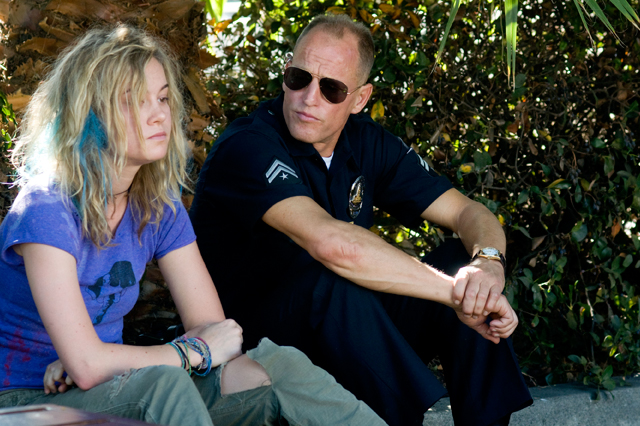
Brie Larson and Woody Harrelson (Millenium Entertainment)
A dirty cop in Los Angeles sounds about as common as the grass being green, and certainly for novelist/screenwriter James Ellroy (L.A. Confidential, the underrated Dark Blue) it’s certainly second nature to go on about it. Hell, at this point it would be against the grain for him to tell a story of an honest cop doing good work in the city. But here we are again with Rampart and the character of David Brown (Woody Harrelson), a Vietnam vet with a troubled past, a troubled present, and if he gets through his current debacle, he will still be a troubled man in the future.
Brown is the last of a dying breed, a particular kind of cop from 1990’s L.A., the sort that were tough and prone to cracking some skulls. “I never shot anyone who was a good guy,” he justifies himself, like an Old West sheriff. He’s also a womanizer, racist, and has fathered children with two women, who are also sisters. All live in the same house (though he’s eventually kicked out and alienates all of the kids). On top of this, he has three big problems: the linger questions surround the death of a supposed rapist, which gave him the moniker “Date Rape Dave”; a cell phone video of him beating a guy who slammed his car by accident; and Brown’s involvement in a robbery witnessed by a homeless man (Ben Foster), who threatens to go all the way to the top with his information. Things are not good.
Director and co-writer Oren Moverman is dedicated to a kind of rigorous authenticity with his characters. It doesn’t mean he’s basing the film on a true story exactly (though I’m sure he and Ellroy have done their homework on the subject), but as with his previous film The Messenger, there’s a raw emotional truth that hangs over many of the scenes. So with David Brown, you may not like him, and you can’t really sympathize with him too much, yet you do understand him, and he’s never less than compelling.
We follow Brown around the city, cruising in his unmarked car, drinking, carousing with a female lawyer (Robin Wright), and trying to get an old colleague (Ned Beatty, great as always even in small doses) to pull some strings for him up top. His situation grows bleaker and bleaker. There’s little hope for the man, not to mention he grandstands when interrogated by a superior in the Rampart division (by Sigourney Weaver, who really has one mode to play—“Are you f***ing kidding me?”—and plays it well.
But there are glimmers of sadness that makes him all too human, such as when his daughters come to visit him in his hotel room and he confesses to them that he’s guilty of what he’s been accused of. It’s a heartbreaking scene for both sides, since he severs the last goodwill he has from anybody in his life. On just a psychological level, the film works as well (perhaps like an East Coast cousin to Abel Ferrara’s Bad Lieutenant) as the character intentionally engages in reckless acts of drug abuse and sexual misconduct, along with his violent behavior. His downward spiral is part of the appeal.
Best of all, and to Moverman’s credit as a director, is the casting. It’s how Harrelson gets to the underlying truth in a scene that makes the character powerful. The movie rests on him to make this unlikable cop watchable, and his volatility makes Rampart so unsettling. He plays Brown as a man with a huge ego and, as with many bad cops, pride, self-satisfaction, and hatred for any authority.
If there is a big downside to the film it’s that Moverman ends the film on a note that doesn’t wrap the story up, which might be fine except that he stops just before it reaches some resolution of whether David Brown will or won’t be damned for good. Up until then, Rampart joins the ranks of the better films about the Evil That Cops Do in L.A. by its rigorous attention to character detail over a plot-driven narrative.






Leave A Comment